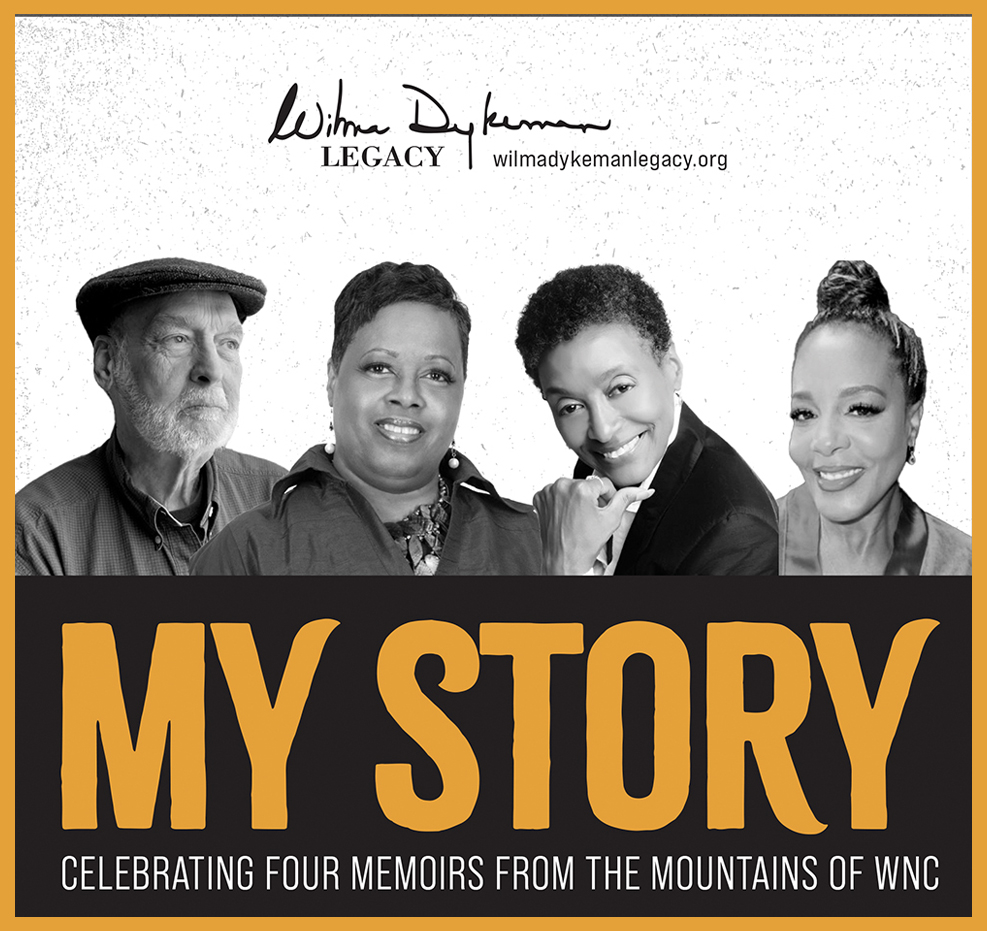By Gina Malone
Beginning in September, the Wilma Dykeman Legacy brings back its popular My Story literary series. My Story 2025: Four Great WNC Memoirs features Cecil Willis (September 11), Priscilla Ndiaye Robinson (October 9), Meta Commerse (November 13) and Tanya Davis (December 11). The author talks will be held from 7–8 p.m. each month at the West Asheville Public Library, and will also be accessible via Zoom.
 Willis, professor emeritus in sociology and criminology at UNC Wilmington, titled his 2023 memoir Hillbilly Odyssey: Resilience in a Small Mountain Mill Town, and intends it as a counter-narrative to stereotypical portrayals of Appalachian people by the popular media and in works like J. D. Vance’s Hillbilly Elegy. Willis’ book describes growing up on a farm in 1950s Canton. “My goal is for readers to have an appreciation of the resilience, self-reliance and indomitable spirit of the Appalachian people,” he says. “Also, I want the readers to recognize that people in Appalachia are not lazy, backward and unsophisticated folk. They are not Snuffy Smith. They care for their neighbors, exhibit a clear sense of community and have a strong work ethic.”
Willis, professor emeritus in sociology and criminology at UNC Wilmington, titled his 2023 memoir Hillbilly Odyssey: Resilience in a Small Mountain Mill Town, and intends it as a counter-narrative to stereotypical portrayals of Appalachian people by the popular media and in works like J. D. Vance’s Hillbilly Elegy. Willis’ book describes growing up on a farm in 1950s Canton. “My goal is for readers to have an appreciation of the resilience, self-reliance and indomitable spirit of the Appalachian people,” he says. “Also, I want the readers to recognize that people in Appalachia are not lazy, backward and unsophisticated folk. They are not Snuffy Smith. They care for their neighbors, exhibit a clear sense of community and have a strong work ethic.”
Ndiaye Robinson, a native of Asheville’s Southside neighborhood and creator of the story-gathering website UrbanRenewalImpact.org, will present her 2007 memoir about difficult years as a single mother to two children. “I was inspired to write A Mother’s Cry: He’s Still My Child to allow others inside my experiences of a child versus a parent, society versus a parent and a parent versus self,” she says. “Parents’ choices impact children more than we may realize.” She hopes her book enlightens schools, court systems, communities and parents about the challenges of raising and educating children without categorizing or stigmatizing them.
Commerse, founder of Story Medicine Worldwide and its Elder Women’s Writers Workshop, wrote Womaning: A Memoir, in 2022, to give her son “the gift of his birth story.” The words flowed from her, offering insight into the significance of elder women’s stories and the benefits of forgiving one’s parents. “From this writing process, I learned to value my lived experiences, and to listen more carefully to those of others,” Commerse says. “It’s a lesson so key in these times, one I’m convinced can point a way toward greater understanding and racial healing. Our stories tend to connect and equalize us.”
The series concludes with Davis’ 2025 Threads: A Tapestry of Life in the Black Community of Shiloh and Beyond. While working on a master’s degree in narrative medicine, she began to process her own stories of growing up in Asheville’s Shiloh community. “As I did that work, the stories of home—the ones I had carried in my body for years—began to surface,” Davis says. “I felt a deep urge to share those stories with my friends and family, and to honor the community that raised me and shaped the way I think. By sharing our stories, we become witness bearers for one another. We give voice to the events of each other’s lives, both past and present. This act is especially important in a time when so many stories are being erased or misrepresented.”
The series invites recognition of the importance of narratives. “Personal accounts from different perspectives and cultures can help to shed light on ways of life different from our own,” says Willis. “And, maybe we can begin to see each other less as caricatures and more as fellow human beings. The hope is that doing so, we can contribute to breaking down the seemingly impenetrable walls that separate us.”
Learn more and register for the Zoom presentations at WilmaDykemanLegacy.org.






